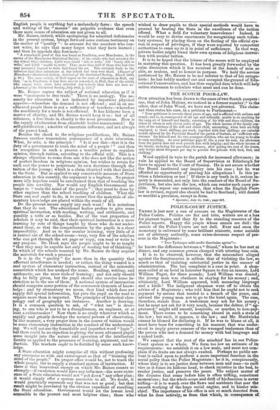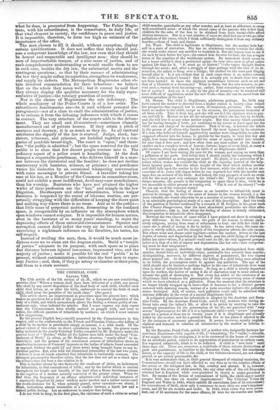POLICE-COURT JUSTICE.
THERE is just now a run of censure on the Magistrates of the Police Courts. Politics are flat and trite, writers are at a loss for piquant topics, and they fly to the standing resource of the Police reports. Happy the people whose annals are dull: the annals of the Police Courts are not dull. Ever and anon the monotony is enlivened by some brilliant niaiserie, some amiable act of arbitrary authority, some extra-decorous respect of per- sons in the Magistrate : " Tros Tyriusque mihi mato discrimine agetur"— he knows the difference between a " friend," whom he has met at dinner, and any common person charged with uttering base coin. It is to be observed, however, that the misconduct alleged against the functionaries is seldom that of violating the law, so much as that of violating substantial justice in the manner of administration. The last complaint is a case in point. A shop- man called at an hotel in Leicester Square to dun an inmate, Lord William Paget, for three pounds; Lord William was denied; the young man was obstinate in staying for his money ; and, ultimately, Lord William appeared, with menacing language and a knife I The indignant shopman went off to obtain the advice of a Magistrate ' • who told him that he ought not to seek payment by means that tended to a breach of the peace, and advised the young man not to go to the hotel again. The case, therefore, stands thus. A tradesman may ask for his money ; but he must not ask for it very much, because the debtor, if " ag- gravated," might add assault, homicide, or murder, to non-pay- ment. There seems to be something absurd in such a state of the law ; but such, it appears, is the law; and Mr. Hardwicke cannot be blamed for declaring it. If he was to blame at all, it must have been for something in his manner, that was under- stood to imply graver censure of the wronged tradesman than of the person who met a demand for money with bad language and a naked knife.
We suspect that the root of the mischief lies in our Police- Court system as a whole. We form too low an estimate of its requirements : we establish it on a low scale, and must not com- plain if its fruits are not always exalted. Perhaps no public ser- vant is called upon to perform a more important function in the social polity than the Police Magistrate : he it is, conspicuously, whose duty is to see justice done between man and man—to curb vice as it raises its hideous head, to check injustice in the bud, to render justice, and preserve the peace. The subject matter of the disputes that come before him is often trifling, sometimes momentous ; but the whole scope and drift of his function is never trifling—it is to watch over the flaws and accidents that mar the smooth working of the huge social engine, and to hinder mis- chief. The importance of his office is not so much descried from what he does actively, as from that which, in consequence of what be does, is prevented from happening. The Police Magis- trate, with his subordinates, is the conservator, in daily life, of that vital element in society, the confidence in peace and justice. It is impossible, therefore, to form too high an estimate of the importance of the office. The men chosen to fill it should, without exception, display certain qualifications. It does not suffice that they should pos- sess a competent knowledge of the law, nor even that they should be honest and respectable and intelligent men : they should be men of imperturbable temper, of a nice sense of justice, and of such comprehensive understanding as would enable them to see in each case, besides the dry law, the substantial merits and the contingent questions ; so that by their manner of administering the law they might soften its asperities, strengthen itsweaknesses and supply its defects. The Metropolitan Magistrates often ob- tain deserved commendation for their behaviour : we believe that on the whole they mean well ; but it cannot be said that they always display the qualities necessary for the daily repre- sentative of justice—the tutelary guardian of society. Nor is the choice of Magistrates the sole deficiency. The whole machinery of the Police Courts is of a low order. The subordinate functionaries are—be it said without personal dis- paragement—not of a class to exalt the administration of justice, or to redeem it from the debasing influences with which it comes in contact. The very structure of the courts adds to the debase- ment. They are small and ill-contrived—sometimes clumsily manufactured out of private houses. If they attain a pitch of neatness and decency, it is as much as they do. In all outward attributes the dignity of the law is starved. Judge, clerk, bar- risters, witnesses, and prisoner, are huddled together in a con- geries of penfolds breast-high. The court is "open," and there- fore " the public is admitted" ; but the space reserved for the said public is so close that few decent people venture into it. The ordinary aspect of a police court is humiliating. At the desk lounges a respectable gentleman, who delivers himself in a man- ner between the dictatorial and the familiar ; he does not decline controversy with barrister, witness, or prisoner ; and perchance varies his dialectics by an occasional whispering conversation with some messenger or private friend. A traveller taking his ease at his inn, or a Member of the Commons in committee-room, could not exhibit a more indifferent, devil-may-care nonchalance, than his worship. Barristers who have not attained the higher walks of their profession are the " bar," and mingle in the low litigation. Doorkeepers and other subordinates, whose vulgar fussiness is tempered by the ennui of irksome routine are per- petually struggling with the difficulties of keeping the doors quiet and making way where there is no room. And as to the public— that little mass of perpetual motion, fermenting in the confined space, is recognizable by an influence on the atmosphere which open windows cannot conquer. It is impossible for human nature, even in the barrister of so many years' standing, to resist the depressing effects of these untoward circumstances. Squalor and Corruption cannot daily infect the very air he breathes without exercising a nightmare influence on his faculties, his tastes, his self-respect.
Instead of reviling the men, then, it would be much more ju- dicious were we to clean out the Augean stable. Build a " temple of justice " adequate to its purpose, with such space as to place due distance between injured innocence, imprisoned vice, and the majesty of justice ; make it possible for the real " public " to be present, without contamination ; introduce the best men to repre- sent Justice ; and, then, if they go astray or slumber at their posts, call them to a stern account.



























 Previous page
Previous page